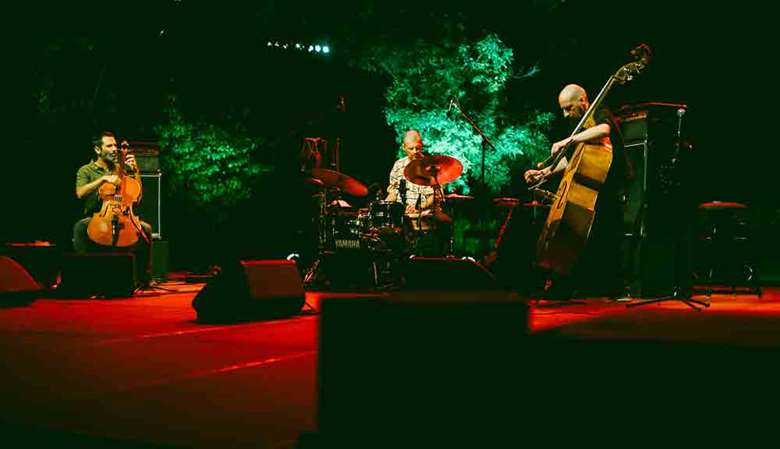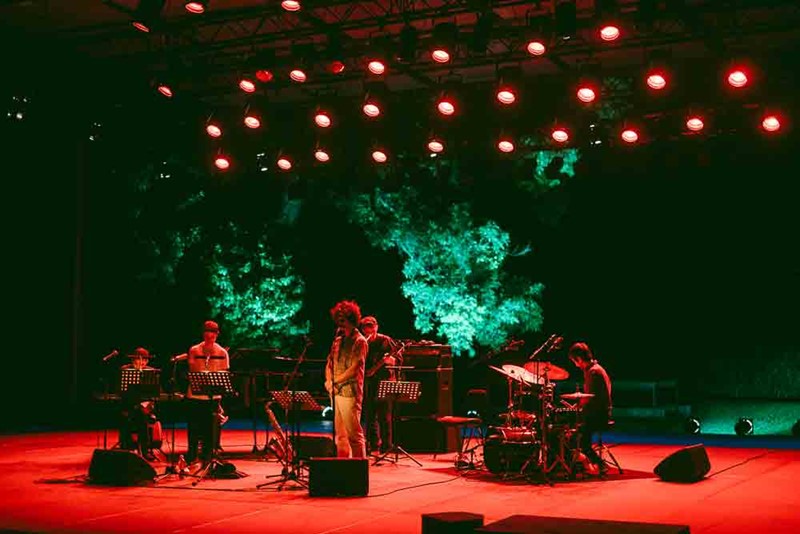Live jazz is back in Lisbon: Jazz 2020 @ Museu Calouste Gulbenkian
Martin Longley
Wednesday, August 5, 2020
Portuguese artists shine at this socially-distanced jazz fest

Following recent reports from Moers and Gent, here’s another festival that’s reconfigured itself into a smaller, virus-era existence, with healthily spaced-out audiences and an indigenous roster of artists. Usually, Jazz em Agosto, in Lisbon, will feature an international line-up, alongside its native Portuguese kernels, but now it’s happening over two weekends as the similarly bluntly-titled Jazz 2020, highlighting some of the country’s most significant local ensembles. The gigs are presented in the impressive outdoor auditorium of the Museu Calouste Gulbenkian, with stone seating surrounded by looming trees and arching grasses, each set beginning at 9.30pm, to avoid any risk of sweltering heat.
The 12-piece Coreto (Bandstand, in Portuguese) made a suitably emphatic opening night appearance, with their horn players ranged on platforms around the rear of the drums, bass, guitar and piano. Coreto came down from Porto, which is Portugal’s second largest city, playing material that sounded further out-there than their earlier works, more abstract, and less mainline big band in nature. The key figure is composer João Pedro Brandão (flute, alto saxophone), but the line-up also includes other familiar Portuguese players such as Susana Santos Silva (trumpet) and Rui Teixeira (baritone saxophone).

The tunes were smoothly lyrical, but streaked with dark hues, particularly brought out by Teixeira, followed by a crisp SSS solo. Free improvisation opened the third number, but then cut into a Metheny-esque guitar solo from the minimally-named AP, with several subsequent pieces relying too much on his playing as a central backbone-pulse. The twinned trombones of Daniel Dias and Andreia Santos also made a dramatic mark, towards the set’s climax.
Susana Santos Silva returned on the second evening, as bandleader, but her Impermanence quintet (above) also included Brandão and pianist Hugo Raro, from Coreto. With Raro and bassist Torbjörn Zetterberg converted to electric manifestations, this is another band that’s altered its sonic character during the last year or two. Zetterberg was notably central, with a distorted flood that formed a fitting swamp-bed from which the horns frequently arose, gleaming and pristine. Surprisingly, they swapped to a circus-toned lollop, with skitter-organ, flute and Zetterberg vocals. One of the most startling episodes had just trumpet and saxophone together, ripping up some space.
Despite the presence of these crucial Portuguese outfits, the weekend’s most exciting discovery was The Selva (Jungle) a trio of Ricardo Jacinto (cello), Gonçalo Almeida (bass) and Nuno Morão (drums). This Lisbon-to-Rotterdam band is relatively unfamiliar, although they have a pair of excellent albums on the Clean Feed label.
The Selva string players were heavily effected by pedals, while the percussion was left stark, and often employing the sharp strike of metal extensions. Supposedly enjoying free improvisation, but often sounding like prepared compositions, the set’s shorter pieces moved through many tones and textures, Jacinto shifting between pizzicato (like a West African n’goni two-stringer, or a flamenco guitarist’s twisted-finger complexity) and bowing (usually steeped in fuzz and/or reverberation). The Selva stand somewhere between e.s.t. and The Necks. On this third night, the wind was blowing very fiercely, vying with the landing jet planes as they caused intense arboreal-rustling and grassy-bending, the atmospheric stage lighting adding to the environmental poignancy. Surely this was food for The Selva’s spontaneous shaping of brooding, portentous constructions? Cello and bass were drawn to drones, while drums ranged freely, creating a sculpted freak-out.
On the virus front, it was overly cautious to impose mask-wearing in a situation where the audience was already outside, and seated with two places empty between each person. Even folks who looked like they were probably same-household ‘couples’ were forced apart. The café also remained closed, so there was a somewhat austere atmosphere, compared to the recent Gent jazzfest. Although, Portugal is now emerging from the ‘red zone’ and Belgium is having a ‘red reprise’, so it seems that we can’t win. Outdoor events have become guerrilla actions, under fleetingly favourable conditions. Get ‘em while you can..!
Jazz 2020’s second weekend is on 7th-9th August gulbenkian.pt/musica/en/jazz-20/